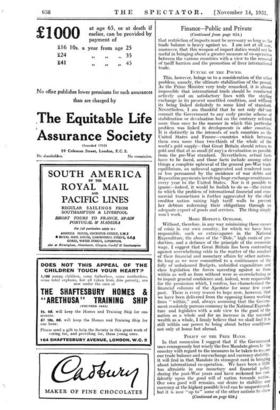FUTURE OF THE POUND.
This, however, brings us to a consideration of the other problem, namely, the ultimate stabilization of the pound. As the Prime Minister very truly remarked, it is almost impossible that international trade should be conducted actively and on satisfactory lines with the sterling exchange in its present unsettled condition, and witlout its being linked definitely to some kind of standard. Nevertheless, I am thankful that he not only did • not commit the Government to any early precise scheme of stabilization or devaluation but on the contrary referred more than once to the manner in which this particular problem was linked to developments in other countries. It 'is distinctly in the interests of such countries as the United States and Frame—countries which between them own more than two-thirds of the whole of the world's gold supply—that Great Britain should return to gold and that at as small (if any) a devaluation as possible from the pre-War standard. Nevertheless, actual facts have to be faced, and those facts include among other things a.complete upheavaL of the general pre-War trade equilibrium, an upheaval aggravated and rendered more or less permanent by the incidence of war debts and Reparation payrhents involving huge exchange remittances every year to the United States. Nor is it possible to ignore—indeed, it would be foolish to do so—the extent to which the problem of international financial and com- mercial transactions is further aggravated by the chief creditor nation raising high tariff walls to prevent her debtors redeeming their obligations through an adequate export of goods and services. The thing simply won't work.


































 Previous page
Previous page